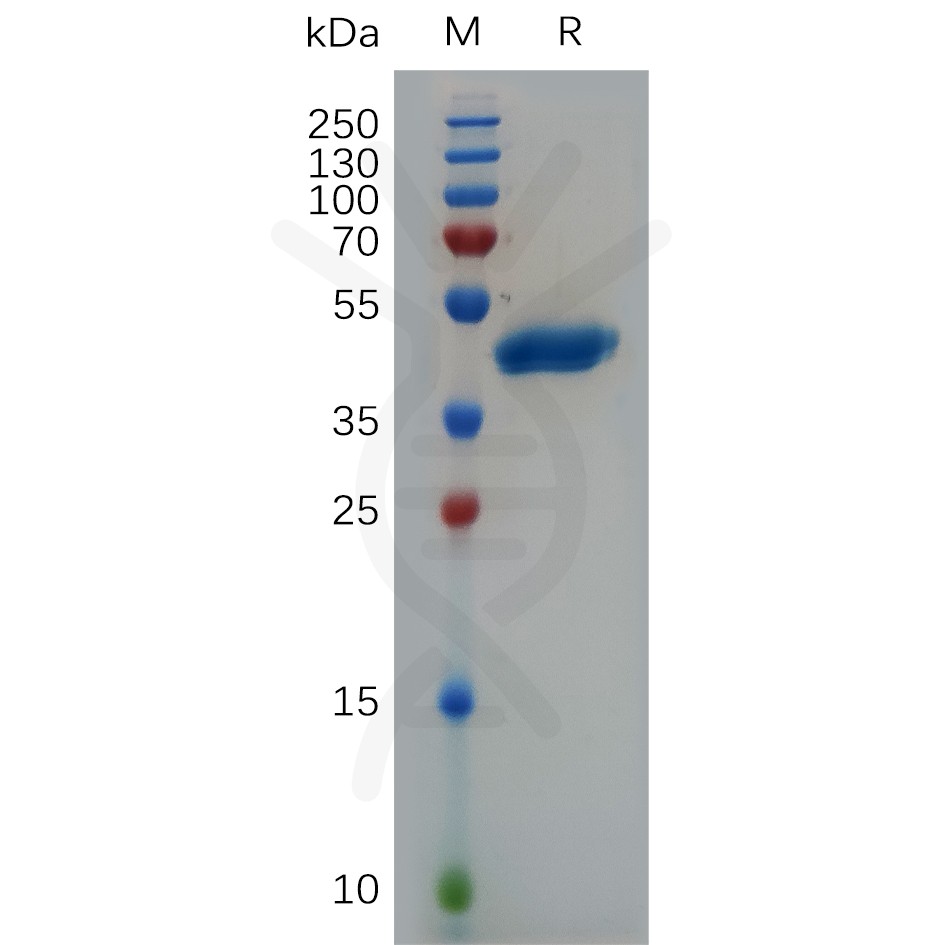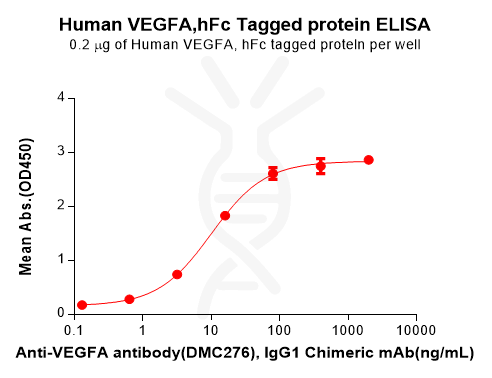| Target | |
|---|---|
| Synonyms | MVCD1, VEGF, VPF, VEGF206 |
| Description | Recombinant Human VEGFA Protein with C-terminal human Fc tag |
| Delivery | In Stock |
| Uniprot ID | P15692-1 |
| Expression Host | HEK293 |
| Tag | C-Human Fc Tag |
| Molecular Characterization | VEGFA(Ala27-Lys147) hFc(Glu99-Ala330) |
| Molecular Weight | The protein has a predicted molecular mass of 40.1 kDa after removal of the signal peptide. The apparent molecular mass of VEGFA-hFc is approximately 35-55 kDa due to glycosylation. |
| Purity | The purity of the protein is greater than 95% as determined by SDS-PAGE and Coomassie blue staining. |
| Formulation & Reconstitution | Lyophilized from sterile PBS, pH 7.4. Normally 5 % – 8% trehalose is added as protectants before lyophilization. Please see Certificate of Analysis for specific instructions of reconstitution. |
| Storage & Shipping | Store at -20°C to -80°C for 12 months in lyophilized form. After reconstitution, if not intended for use within a month, aliquot and store at -80°C (Avoid repeated freezing and thawing). Lyophilized proteins are shipped at ambient temperature. |
| Background | This gene is a member of the PDGF/VEGF growth factor family. It encodes a heparin-binding protein, which exists as a disulfide-linked homodimer. This growth factor induces proliferation and migration of vascular endothelial cells, and is essential for both physiological and pathological angiogenesis. Disruption of this gene in mice resulted in abnormal embryonic blood vessel formation. This gene is upregulated in many known tumors and its expression is correlated with tumor stage and progression. Elevated levels of this protein are found in patients with POEMS syndrome, also known as Crow-Fukase syndrome. Allelic variants of this gene have been associated with microvascular complications of diabetes 1 (MVCD1) and atherosclerosis. Alternatively spliced transcript variants encoding different isoforms have been described. There is also evidence for alternative translation initiation from upstream non-AUG (CUG) codons resulting in additional isoforms. A recent study showed that a C-terminally extended isoform is produced by use of an alternative in-frame translation termination codon via a stop codon readthrough mechanism, and that this isoform is antiangiogenic. Expression of some isoforms derived from the AUG start codon is regulated by a small upstream open reading frame, which is located within an internal ribosome entry site. The levels of VEGF are increased during infection with severe acute respiratory syndrome coronavirus 2 (SARS-CoV-2), thus promoting inflammation by facilitating recruitment of inflammatory cells, and by increasing the level of angiopoietin II (Ang II), one of two products of the SARS-CoV-2 binding target, angiotensin-converting enzyme 2 (ACE2). In turn, Ang II facilitates the elevation of VEGF, thus forming a vicious cycle in the release of inflammatory cytokines. |
| Usage | Research use only |
| Conjugate | Unconjugated |
Human VEGFA Protein, hFc Tag
Price: 10μg $79.00; 50μg $281.00 ; 100μg $422.00
Product Data Dima FAQ
Images Dima FAQ

Figure 1. Human VEGFA Protein, hFc Tag on SDS-PAGE under reducing conditions.

Figure 2. ELISA plate pre-coated by 2 μg/mL (100 μL/well) Human VEGFA Protein, hFc Tag(PME101031) can bind Anti-VEGFA antibody(DMC276), IgG1 Chimeric mAb in a linear range of 3.20–16 ng/mL.
Related Products
Biosimilar reference antibodies
SKU: BME100682P Target: VEGFA
Application: Flow Cyt
Price: 100 test $192.00
Biosimilar reference antibodies
SKU: BME100682B Target: VEGFA
Application: N/A
Price: 50μg $99.00 ; 100 μg $199.00
Biosimilar reference antibodies
SKU: BME100061P Target: VEGFA
Application: Flow Cyt
Price: 100 test $192.00
Biosimilar reference antibodies
SKU: BME100688 Target: VEGFA
Application: N/A
Price: 50μg $82.00 ; 100 μg $162.00
Biosimilar reference antibodies
SKU: BME100688B Target: VEGFA
Application: N/A
Price: 50μg $99.00 ; 100 μg $199.00

